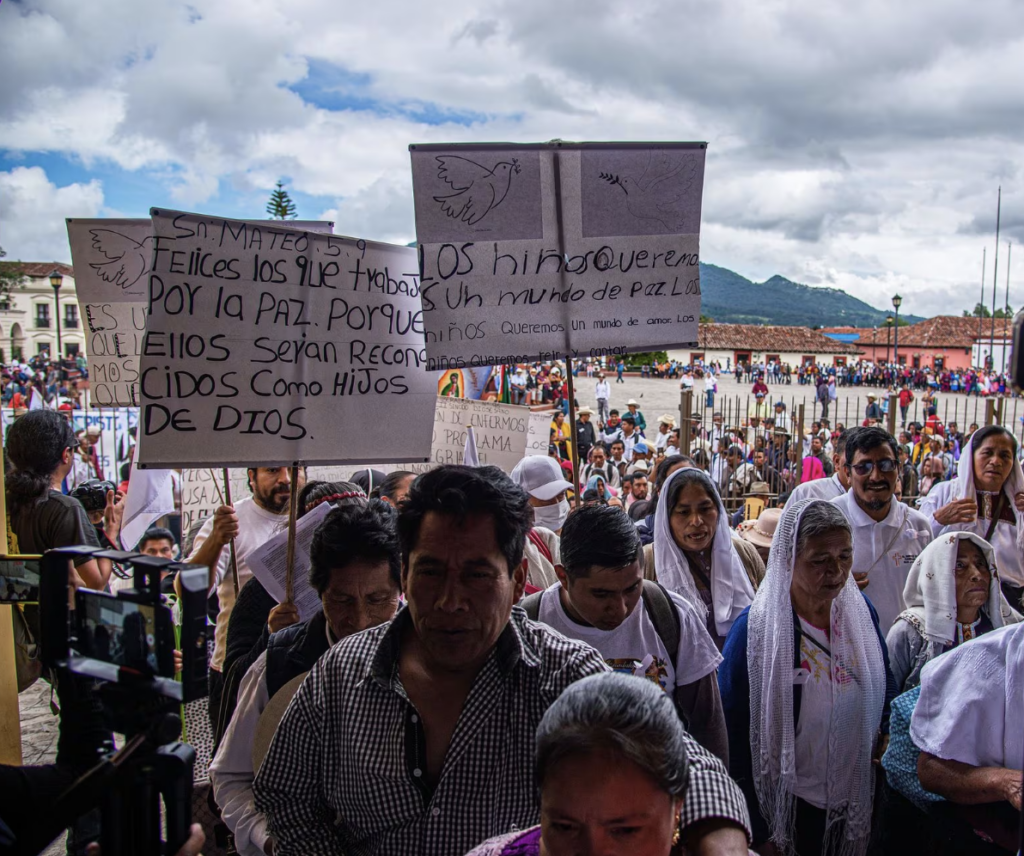
07/26/14 (written by cmolzahn and lcalderón) — A federal judge based in Michoacán issued indictments for 72 former members of a Michoacán self-defense group (grupos de autodefensa) arrested on June 27, alongside José Juan Mireles, the former leader of the Tepalacatepec self-defense group and widely recognized as the face of the self-defense movement in Michoacán. They will face charges of illegally carrying weapons meant for exclusive use by the military, a federal crime for which they will be required to remain in prison for the duration of their criminal proceedings. In the same action, the judge absolved the men of pending charges of involvement with organized crime.
On Friday, June 27, Mireles and 74 other members of his organization were arrested in a joint operation by the Federal Police (Policía Federal, PF), Navy (Secretaría de Marina, SEMAR), Army (Secretaría de la Defensa, SEDENA), and Michoacán Attorney General’s Office (Procuraduría General de Justicia del Estado, PGJE). No shots were fired during the operation. According to the PGJE, Mireles and the detained group members were all arrested for being in violation of Mexico’s Federal Law of Firearms and Explosives (Ley Federal de Armas de Fuego y Explosivios).
Reports from June 26, the day before Mireles’ arrest, noted that a group of 300-armed autodefensa members had arrived at La Mira just outside the port of Lázaro Cárdenas, Michoacán, with the stated intent of taking back the city. Mireles claimed, “We are retaking La Mira with the plan to head to Lázaro Cárdenas, and from there to Morelia.” Mireles has made clear his distrust of Mexico’s federal government ability and willingness to provide public security and stability to Michoacán, and helped spearhead the self-defense movement that began in February 2013 aimed at addressing the state’s high levels of crime and violence.
Nevertheless, Mireles’ arrest and eventual trial add another level to the ongoing developments in Michoacán. On May 10, the deadline for members of Michoacán’s self-defense groups to either disarm or officially join the Rural Defense Corps (Cuerpos de Defensa Rural) and register their weapons passed. As such, Michoacán Security Commissioner Alfredo Castillo Cervantes had warned that all those found with weapons after May 10 who had not registered would be arrested. Although Mireles initially signed the agreement, he acknowledged that the autonomous self-defense groups play a fundamental role in achieving a safer Michoacán, and thus vowed that the fight would continue until the state had been secured. Despite the clear presence still of active self-defense groups, Security Commissioner Castillo warned that, “not one self-defense group will enter the capital city of Morelia [as Mireles had previously stated], and those that do not join the institutions and remain armed are going to be detained.” Later in the month, Castillo stated publicly that self-defense groups in the state “no longer exist.” Speaking in front of a group of businessmen in the municipality of Uruapán, Castillo said that such groups ceased to exist on May 10 of this year with the creation of the State Rural Police Force (Fuerza Estatal Rural), to which many members of self-defense groups enlisted. Castillo made the comments amidst numerous demonstrations in the state by self-proclaimed self-defense groups, and he did not clarify whether his statement was intended to refer to such groups enjoying official recognition, as they did before the creation of the rural defense forces in May. He also maintained that levels of extortion were down in the state, which he said would contribute to a more favorable business climate.
Meanwhile, residents of Buenavista Tomatlán, Michoacán, released 11 police officers on July 15 that they had taken captive a day earlier in demand for the release of 32 self-defense members from their community arrested in March 2013. According to a representative of the town, associates of Commissioner Castillo had committed to releasing the 32 men in 12 days. The agents—nine from the Federal Police and two state officers—had been held in the municipal police station, which residents are still occupying to maintain pressure on the government to satisfy their demands.
Sources:
“News Monitor: May 2014.” Justice in Mexico. May 2014.
Gil Olmos, José. “Las autodefensas mexicquenses.” Proceso. June 18, 2014.
Martínez, Dalia. “En Michoacán ya no hay autodefensas, afirma Castillo.” El Universal. July 7, 2014.




